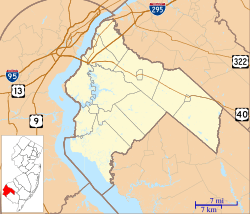Daretown, New Jersey facts for kids
Quick facts for kids
Daretown, New Jersey
|
|
|---|---|
| Country | |
| State | |
| County | Salem |
| Township | Upper Pittsgrove |
| Named for | Samuel Dare |
| Elevation | 41 m (135 ft) |
| Time zone | UTC−05:00 (Eastern (EST)) |
| • Summer (DST) | UTC−04:00 (EDT) |
| GNIS feature ID | 875799 |
Daretown is a small, quiet place in New Jersey. It's called an "unincorporated community," which means it's a neighborhood or area that doesn't have its own local government like a city or town. Instead, it's part of a larger area called Upper Pittsgrove Township. Daretown is located in Salem County, in the southern part of the state.
Two important waterways flow near Daretown. The Alloway Creek runs to the south. The Salem River flows to the north. These rivers are part of the natural landscape around the community.
Contents
History of Daretown
How Daretown Got Its Name
Daretown is named after an early settler, Samuel Dare. He was an important person in the community. Samuel Dare opened a store in his own house. He also helped manage the local church. After he passed away in 1838, the settlement was named in his honor.
Early Buildings and Growth
Daretown has a rich history with several important buildings. The historic Pittsgrove Baptist Church is located right in Daretown. Another old church, the Pittsgrove Presbyterian Church, is found southwest of the community.
In 1863, a train station was built in Daretown. This station belonged to the Salem Railroad. This building was very important. It also served as the first post office for the area.
Daretown's Role in Farming
For many years, Daretown was a busy place for farming. From 1906 to 1923, it was a major center for shipping potatoes. Farmers would grow potatoes nearby and send them out from Daretown's train depot.
Education in Daretown
The community also focused on education. A school building was built in Daretown in 1876. This shows that people in Daretown valued learning for their children.
Population Growth
By 1882, Daretown had grown quite a bit. The population reached about 250 people. This shows that more families were choosing to live and work in this growing community.
 | Chris Smalls |
 | Fred Hampton |
 | Ralph Abernathy |




